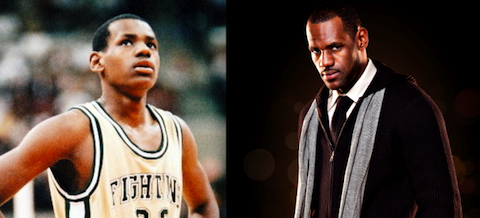Just in time for the NBA Playoffs, a new book called In Kin to the King: A LeBron James Family History has been written by LeBron James’ great-uncle Steven J. Nelson Sr. which is ostensibly about tracing the Akron-based family history. In order to drum up some publicity for the project, Nelson dished out a little dirt about LeBron yet simultaneously maintains that the book isn’t really about the NBA mega-superstar, even though the title of the book bears his full name and nickname.
According to James’ great-uncle, Steven J. Nelson Sr., many of James’ ”castaway relatives” have felt overlooked for a long time.
In Kin to the King: A LeBron James Family History, Nelson, whose late sister Freda was the mother of LeBron’s mother Gloria James, remarks that, although the star has been quoted about the importance of family, he initialed rather than signed a relative’s card ”since his signature is valuable.” Nelson is quick to point out that ”we are not gold diggers or opportunists looking for a handout.”
The book isn’t about LeBron James anyway: It’s about a family, one that Nelson traces back to 1849 Georgia and a free black sharecropper named John William Gay. His descendants came to Northeast Ohio around 1910, and to a house on Hickory Street in Akron that became the family stronghold. Nelson tells of hardworking, strong-willed individuals (and a few rogues), giving not only a picture of a close-knit family but of a changing Akron.
Owing in large part to his “The LeBrons” Nike commercials, I can’t resist imagining generations of identical LeBrons throughout various points in time of American history, much like Biff in the Tanner family lineage at the fictitious Hill Valley of the Back To The Future trilogy.
More importantly, I’m also reminded of a passage written by J.R. Moehringer in the September issue of GQ profiling James right after The Decision:
As the only child of a single mother—Gloria, who gave birth at 16—James grew up poor, alone, never knowing his father. At first he and his mother lived with his grandmother in a big, roomy house, but when James was almost 3, his grandmother died. Heart attack. Christmas Day. (When I ask him later to pick the angriest he’s ever been, he picks that day.)
With little education and scant work, Gloria couldn’t hang on to the house. She and James hit the streets, moving constantly, and when James was in the fourth grade he essentially stopped attending school. He also spent many nights by himself, praying for his mother to come home. Sometimes she disappeared for days. “I became afraid that one day I would wake up and she would be gone forever,” James writes. “It’s all I really cared about when I was growing up, waking up and knowing that my mom was still alive and still by my side.”
We don’t know for sure what the real story is from either side but it seems to me that these distant relatives didn’t seem to be very worried about keeping in touch with James until AFTER he picked up a basketball. I’m sure a 9-year-old James felt “overlooked” and a “castaway relative” as well when he was alone in his house for days in an unsafe neighborhood. Besides, is it that odd to not be in regular contact with a great-uncle when you’re a grown adult? After all, James claims to not even know his own father’s whereabouts.
Hmmm, an unknown family tree of its own, possible book sequel?

